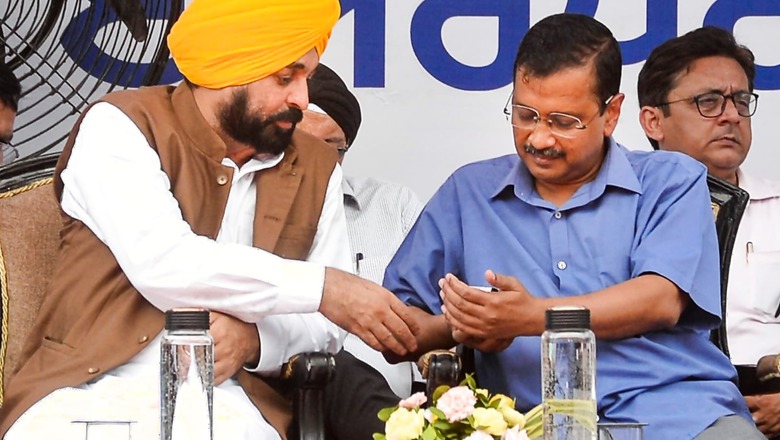
views
The Aam Aadmi Party’s honeymoon with Punjab’s voters may well be over. Pervasive disenchantment with the Bhagwant Mann government has manifested in pro-separatist leader Simranjit Singh Mann’s victory in the Sangrur bypoll — an event that raises red flags not just for AAP but for Punjab as a whole.
The AAP appears to have misread the state, ignoring the economic, social and cultural forces at play. It failed to realise that its stunning sweep in the Assembly elections was less an endorsement of the party itself than a ‘Hail Mary’ by voters in a state on the brink of utter collapse. Punjab was crying for good governance; AAP failed to provide it.
Sangrur was a chronicle of an election foretold. Why did voters turn to a 77-year-old former policeman and Khalistan sympathiser rather than to the AAP, which had won all the Assembly segments in Sangrur, including the chief minister’s seat, just three months ago?
Simranjit Mann tapped into the very same wellspring of discontent that had brought the AAP to power, but gave it an edge by rallying voters around the cause of ‘Punjabiyat’. He harped on the assassination of rap artiste and youth icon Sidhu Moosewala, invoking the sense of Punjabi pride and assertion that the latter represented.
Moosewala’s murder, the day after the AAP government withdrew his security and then bragged about it, raised the hackles of youth across the state. Particularly so in Sangrur, where the family of his fiancee is based.
Much has been read into Mann’s identification with radicals, although he has removed the ‘Khalistan’ from his Twitter bio. Seen in tandem with a recent upsurge of activity by separatist outfits based overseas, as well as signs of religious revivalism, it seems to herald a return of extremist forces to Punjab.
One such organisation, Sikhs for Justice, is suspected of being involved in the recent clashes between pro- and anti-Khalistan groups in Patiala, and to the tying of Khalistan flags over the main entrance and boundary wall of the Himachal Pradesh Assembly complex in Dharamshala.
The fact is that the silent majority in Punjab want no truck with extremism. All they want is change, a new narrative of hope. After two decades of relentless decline, of disillusionment with successive governments, of drug mafias and oppressive rent-seeking by politicians and bureaucrats, of widening disparities between small and big farmers and of being overtaken by neighbouring states, Punjab needs more than just freebies or platitudes.
That post-electoral cognitive dissonance set in among voters within days of Bhagwant Mann taking oath as CM was evident. The AAP was unable to make good on its promised flagship schemes: A dole of Rs 1,000 per month to all adult women in the state and free power to all domestic consumers (in addition to farmers).
Worst of all, the law and order situation in the state deteriorated, with a series of daylight murders including those of noted kabaddi players, the Patiala riot, a brazen grenade attack at the Punjab Police Intelligence HQ at Mohali, and bloody clashes in multiple locations over control of truck unions, allegedly involving AAP workers.
Even as questions were raised about the functioning of the state police, it was their counterparts in Delhi who achieved a major breakthrough in the Moosewala murder, by arresting two of his shooters along with their accomplice.
This brings us to the AAP’s disregard for Punjab’s historically independent-minded spirit. By using the Punjab police to target critics of Delhi CM Arvind Kejriwal, such as BJP leader Tajinder Bagga, poet Kumar Vishwas and Congresswoman Alka Lamba, CM Mann appeared to be kowtowing to Delhi. To make matters worse, he was seen to be dancing attendance on Kejriwal during the latter’s campaign tours in Gujarat and Himachal, rather than putting out fires in his own state. This offended the common man’s amour propre.
The AAP has also missed an opportunity for economic revival in its maiden budget. Realistically, there was no room for the kind of mega-investment that Punjab urgently needs, given that the state is neck deep in debt (Rs 3 lakh crore), with no hope of digging its way out without active intervention from the Centre. Given the crippling demands of debt-servicing and a massive salary bill, the fact that Punjab has the lowest per capita capital investment in the country is hardly surprising.
The Delhi freebie model cannot possibly work in Punjab, given the lack of resources. The budget is therefore silent on the promised handouts to women and while there has been an attempt to make good on the free power promise, it is likely to come with riders.
The point is that there is no hint of reforms, no credible attempt at improving the state’s abysmal ease of doing business ranking or restoring fiscal health. If the state is to become competitive and create job avenues for youngsters in situ — rather than exporting them to greener pastures — the AAP has to go beyond the freebie culture and take the fiscal bull by the horns.
If the AAP fails to address the state’s developmental discontents and usher in a ‘nawa Punjab’, it is a foregone conclusion that anti-national forces will exploit the angst-ridden and frustrated youth. There is already a gun culture of sorts prevailing in the state, and it takes very little to create a manufactured sense of victimhood among the aspirational youngsters. The danger signals are already there.
From this perspective, the state and Centre need to work together on two fronts: First, to usher in transformative reforms, however politically unpopular they might be and second, to galvanise the Punjab Police so that it pro-actively takes on threats to national security.
Bhavdeep Kang is a freelance writer and author of ‘Gurus: Stories of India’s Leading Babas’ and ‘Just Transferred: The Untold Story of Ashok Khemka’. A journalist since 1986, she has written extensively on national politics. The wiews expressed in this article are those of the author and do not represent the stand of this publication.
Read all the Latest News , Breaking News , watch Top Videos and Live TV here.



















Comments
0 comment